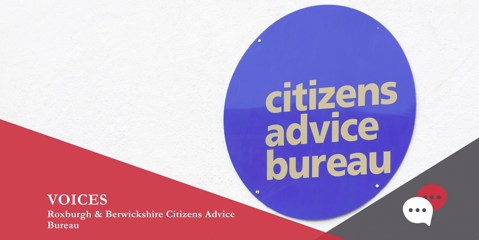
- What is your organisation working to achieve?
Roxburgh & Berwickshire Citizens Advice Bureau are for the first time, working with a consortium of Bureaux from across the south of Scotland (Dumfries & Galloway CAS, Peebles & District CAB and Central Borders CAB) with the specific purpose of improving access to employment rights advice and support but also to address the root of the issue, by providing guidance to employers on Scotland’s Fair Work Agenda and how to embed these in their workplace.
Over and above this, we are hoping to achieve a consistent level of employment advice and support across the south of Scotland as the four Bureau work together to ensure the success of the Employment Rights & Advice Service (ERAS).
- Where are you focusing your support right now?
The Employment Advisers are focussed on supporting generalist advisers in the Bureau, to assist clients who are experiencing issues with a grievance or disciplinary action. They provide hands-on, in-house guidance to upskill employment advice across the network but are then able to accept referrals for support when clients reach the Early Conciliation stage. In the past, clients would be pointed towards ACAS and the bureau would take a step back. For many, this next step was too daunting and ultimately, they would withdraw their case, simply accepting the actions of their employer. Now, they are guided and supported all the way through to Employment Tribunal.
The coordinator for the project is focussing on building relationships with partners like Skills Development Scotland and The Business Gateway, as well as working on the delivery of tangible resources that employers can use to ensure they meet Scottish standards of employment. A comprehensive training package and delivery timetable is being created to expand on existing employment advice skills but also encourage and build confidence in generalist advisers to increase the competency of those in their local Bureau.
- How do poverty and trauma figure in your work?
Maintaining people’s employment and assisting employers to understand the benefits of embedding fair work practices into the workplace, prevents the need to access the welfare benefits system, meaning a higher household income.
Areas where unemployment levels are low, means more local spending which improves local amenities and usually lower crime levels follow. Losing household income or even challenging unfair work practices can be stressful and creates pressure in the household. Being provided with advice, support and representation at an early stage should help clients feel supported with less impact on their daily lives.
In some cases, employment cannot be maintained but as the ERAS project is firmly rooted in the CAB services across the south of Scotland, holistic advice and support is provided as a package, which can limit any negative impact on maintaining secure housing and prevent harmful financial situations from arising.
- How can funders support your work?
The Bureau has built a strong working relationship with The Robertson Trust. Over the course of the last 8 years, trust has built and we feel like a trusted partner. It is far beyond the regular relationship the Bureaux has with funders.
Having direct contact makes all the difference. Someone who knows what you want to achieve and can directly input from the perspective of the funder.
- What changes would you like to see in your area of focus during the next five years?
It is hoped that the Bureaus operating across the south of Scotland are better equipped and feel more able to support employees in maintaining or instructing their employment rights. Employment advice will be as mainstream as providing benefits, debt, or housing advice and advisers will feel able to offer representation.
Its hoped that the Bureau will have adopted a new attitude to giving advice to employers. Something that very rarely happens and when it does it somehow feels morally wrong given CABs have always supported the employee. Changing this mindset and giving advice to employers to prevent poor employment practices will improve working conditions and lessen the need for employees to seek advice and intervention from the outset.
- What long-term system changes would best address the issues?
The Scottish Government has taken the first steps by producing an agenda for change. What needs to happen now is education and support for the implementation of the Fair Work agenda. Publicity has been slow and sometimes nonexistent so, long-term, we need to see improved publicity and access to advice, support, and the resources to make these changes “the norm”.
How Roxburgh & Berwickshire Citizens Advice Bureau's work fits with our 2020-2030 strategy
We know that since the start of the pandemic, the need for employment advice and support has grown significantly across Scotland. Having secure, fair and flexible working practices is a protective function for many people against poverty and that is why through our funds, we are interested in supporting work that improves employability services and employability rates for key population groups who are at risk of poverty.
The scale and complexity of the problems relating to poverty and trauma often requires a collaborative approach through partnership working. Through our funds, we encourage applications from those who have a desire to work collaboratively with others on addressing poverty and trauma. The partnership project between the four Citizen Advice Bureaux in the Scottish Borders seeks to advance fair working practices in Scotland in partnership with each other, which is why we are pleased to be supporting this project through our funds.
Wendy Knowles
Funding Manager
